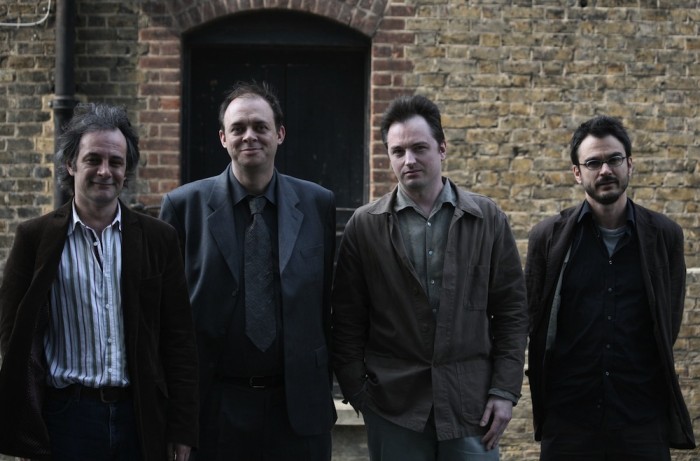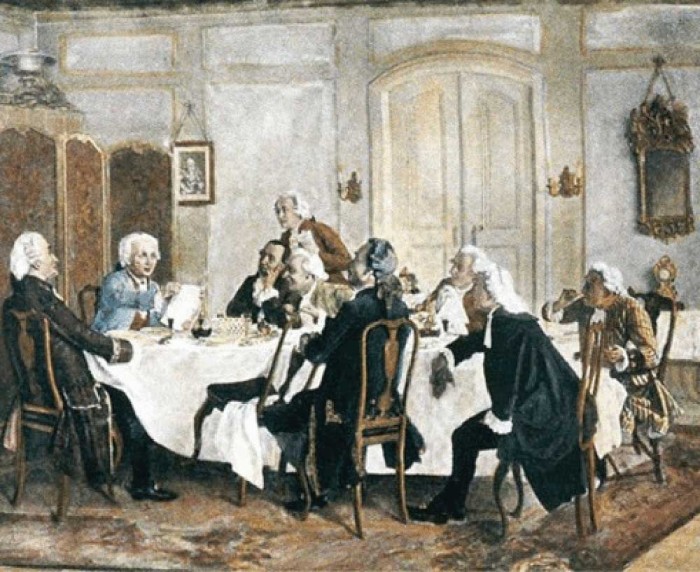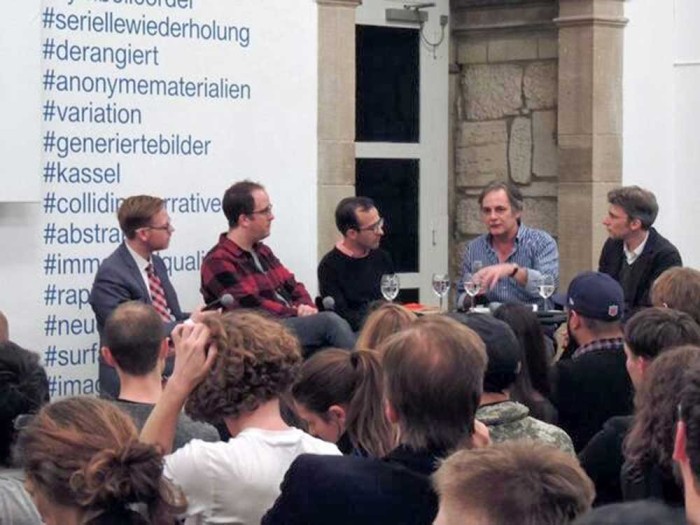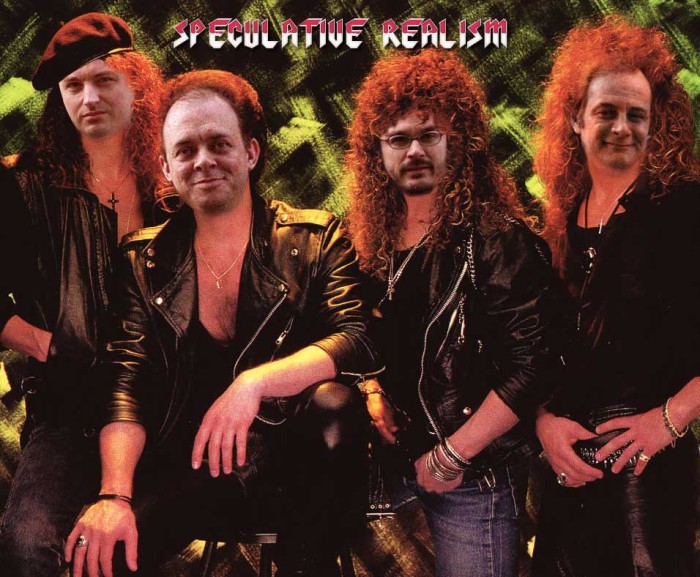
01.06.2015
A conference held at Goldsmiths College in 2007 is regarded as the founding moment of Speculative Real- ism; its earliest protagonists were Ray Brassier, Iain Hamilton Grant, Graham Harman, and Quentin Meillassoux. In the following contribution, Steven Shaviro portrays the theories of an emerging group – perceived by outsiders as a new school of thought or even as an exclusive “boys’ club.” What do their approaches have in common, and where do they diverge? Wherein lies the speculative momentum of this philosophy, and what are the premises it objects to?
 Left to right Iain Hamilton Grant, Graham Harman, Quentin Meillassoux, Ray Brassier
Left to right Iain Hamilton Grant, Graham Harman, Quentin Meillassoux, Ray Brassier
(German: Spekulativer Realismus für Anfänger)
From: TEXTE ZUR KUNST #93: Spekulation/Speculation, March 2014, pp. 40-51
A conference held at Goldsmiths College in 2007 is regarded as the founding moment of Speculative Realism; its earliest protagonists were Ray Brassier, Iain Hamilton Grant, Graham Harman, and Quentin Meillassoux. In the following contribution, Steven Shaviro portrays the theories of an emerging group – perceived by outsiders as a new school of thought or even as an exclusive “boys’ club.” What do their approaches have in common, and where do they diverge? Wherein lies the speculative momentum of this philosophy, and what are the premises it objects to?
One salient point of agreement between these positions is the recourse to, or revision of, Kantian thought. They argue that the primacy of epistemology over ontology that has dominated philosophy since Kant leaves it stuck in perpetual scrutiny of the conditions of thinking. The Speculative Realists, by contrast, assume that the world is independent in some way of our conceptualizations of it. The very fact that the “thing in itself” is unknowable, as Kant declared, is supposed to make it suitable as an object of speculation. An operation Shaviro describes as a leap into fundamental uncertainty.
Modern Western philosophy – at least since Immanuel Kant published his “Critique of Pure Reason” in 1781 – has tended to privilege epistemology over ontology. Ontology is concerned with the nature of being, with defining, on the most basic level, what is. Epistemology, in contrast, is concerned with how we know whatever it is that we know. It scrutinizes the grounds and limits of our ability to know the world. To say that epistemology must come before ontology is simply to point out that, in order to make assertions about what the world is like, we must be able to give grounds for these assertions, to explain how we can know that they are true. Kant observed that the philosophy of his time was unable to provide such grounds. Either it was dogmatic, claiming to discover metaphysical necessity by pure logical deduction, untethered to observation or empirical evidence; or else it was sceptical, grounded in empirical facts and in subjective experience, but unable to generalize beyond these particular facts and that immediate experience. Against both of these tendencies, Kant insisted that philosophy must start by scrutinizing, and thereby accounting for, its own foundations. If it failed to do this, and instead launched directly into metaphysical speculation, then only nonsense would result. For Kant, and for most philosophers ever since, we can only claim to know something (rather than just believing something blindly) when we can explain how we have come to know it, and what justifies our claims that it is true.
In principle, this priority of epistemology over ontology seems unexceptionable. But in practice, it has become quite problematic. For it means that we end up talking not about things in the world that we encounter, but rather about our own process of encountering them. Kant insists that “things in themselves” are unknowable; all we can really be sure of is phenomena – how things appear to us. In the centuries since Kant, this has become a sort of common sense. Today we take it for granted that we can never see things as they really are, because we can never escape the distorting lenses of our own impositions on the world. Today, these impositions have gone beyond Kant’s categories to include such things as language, our particular cognitive mechanisms, and our cultural biases and ideologies.
Epistemological reflection is important, because it makes us aware of our own prejudices and otherwise unquestioned assumptions. But at the same time, ironically, such reflection makes it nearly impossible for us to escape from these biases and assumptions. We are trapped inside our own perspectives, unable to take a view from any where else. Now, it is indeed important and necessary for us to worry about the danger of making over everything – other people, other living entities, and other things in the universe – in our own image. But the price we pay for averting this danger is that we end up speaking only about, and only to, ourselves. When this process is pushed far enough, we come to believe that the world is just an arbitrary social or linguistic construction, that it consists only of what we ourselves have put into it. For the late-twentieth-century postmodern philosophy of thinkers such as Richard Rorty, and, in a more subtle/complex way, Jacques Derrida, there is no way to escape from this straighjacket: All we can do is point it out, and deplore it. We can never get beyond ourselves, so as to encounter something genuinely different.
The twenty-first-century revival of philosophical speculation is an effort to break free of this dilemma. It seeks to undo the Kantian privileging of epistemology – but it does this for very Kantian reasons. Kant’s own promotion of epistemology, and his ban on metaphysical speculation, came out of his effort to avoid both the Scylla of dogmatic rationalism, and the Charybdis of empiricist scepticism. The current inversion of Kant, with its demotion of epistemology, comes out of a similarly inspired effort to avoid both the Scylla of blind logocentrism and ethnocentrism, and the Charybdis of infinite deconstruction and auto critique. Kant denounced speculation because it overstepped the bounds of all possible knowledge. For today’s new speculative thinkers, in contrast, speculation is necessary precisely because of the limits of knowledge. There is so much that is real, but that we cannot ever possibly know. Twenty-first-century speculation begins where our solid knowledge ends. Far from making dogmatic claims, this new form of speculation paradoxically explores the space of the ungraspable, and the time of the unpredictable.
 Kant and his dining companions, 1892/1893
Kant and his dining companions, 1892/1893
In 2007, four philosophers presented their work at Goldsmiths in London under the banner of Speculative Realism: Quentin Meillassoux, Graham Harman, Ray Brassier, and Iain Hamilton Grant. They partly knew each other and each other’s work. While they have occasionally been perceived as a relatively homogenous group, several of them have since renounced the rubric of Speculative Realism; and indeed, the differences among these thinkers are so great that they cannot be said to comprise a single philosophical school. Yet, the label of Speculative Realism is still useful, to indicate that these thinkers at least share an important starting point. In Harman’s words, “all it takes to be a speculative realist is to be opposed to ‘correlationism’, Meillassoux’s term for the sort of philosophy (still dominant today) that bases all philosophy on the mutual interplay of human and world.”
Speculative Realism insists upon the independence of the world, and of things in the world, from our own conceptualizations of them. It rejects the Kantian thesis that the order of the world depends upon the way that our minds (or our languages, or our cultures) work to structure it. And it also rejects the phenomenological assumption of a primordial reciprocity or correspondence between self and world, or subject and object, or knower and known. Reality is far weirder than we are able to imagine. Things never conform to the ideas that we have about them; there is always something more to them than what we are able to grasp. The world does not fit into our own cognitive paradigms and narrative modes of explanation. “Man” is not the measure of all things. This is why speculation is necessary. We must speculate, to escape from our inveterate anthropocentrism and take seriously the existence of a fundamentally alien, nonhuman world.
There is not one predetermined form of speculation. It’s a voyage into the unknown, without any assurance of a proper ending. In this regard, one can contrast philosophical speculation, which is open-ended, with financial speculation, which is always done with the aim of ultimately turning a profit. Speculation by hedge funds in today’s derivative markets is conceived as a way to calculate and quantify risk. By taking account of the laws of probability, investors are able to make a profit, no matter what happens in the market. Financial speculation is thus a way to manage and control the future. It rests on the unquestioned assumption that the future will be commensurate with the present. In contrast, metaphysical speculation confronts, not risk, but irreducible uncertainty. This distinction was first made by the great economist John Maynard Keynes. Risk is governed by statistical rules that divide the chances among a fixed number of possible outcomes: think of tossing coins or throwing dice. But uncertainty cannot be quantified in probabilistic terms. We have no way of knowing which outcomes are possible, let alone how many of them there are, and how likely any of them is. Today, most economists and financial experts ignore Keynes’s analysis, and wrongly assume that derivatives and futures markets can be understood in terms of risk rather than uncertainty. Whatever the case may be in economics, however, philosophical speculation is entirely a matter of basic uncertainty, rather than manageable risk. There is no formula to guide the process of such speculation. Each of the speculative realist thinkers proposes a different way to speculate about the world, as it exists unknowably apart from us.
 Left to right : Markus Gabriel, Robin Mackay, Reza Negarestani, Iain Hamilton Grant, Armen Avanessian at a symposium at Fredericianum, Kassel
Left to right : Markus Gabriel, Robin Mackay, Reza Negarestani, Iain Hamilton Grant, Armen Avanessian at a symposium at Fredericianum, Kassel
Ray Brassier, in his book “Nihil Unbound”, doesn’t altogether reject Kant’s epistemological concerns, his insistence upon categories and regulative ideals – or what today we would more likely call norms of rationality – that govern the ways in which we can legitimately talk about the world. But Brassier goes beyond Kant, and engages in a form of radical speculation, when he detaches these norms from Kant’s implicitly human-centered focus. For Brassier, Kant’s categories, such as causality, are not structures that our own minds impose upon the world, in order to give it some intelligible order. Rather, these methods and assumptions are forced upon us from outside, as we seek to approach things that are alien and opaque to our minds. Rationality is terrifyingly inhuman. Physical science allows us to conceptualize a world that is not in any sense made to our measure. But the scientific project can never be complete or final, as the world is ultimately non-conceptual and unconceptualizable. Our ideas of things can never match up to the things themselves. For Kant, this meant that we were relegated to – but also safely grounded within – the realm of phenomena, or mere appearances. But for Brassier, as we incessantly approach (but never finally reach) things in themselves, we are divested of everything that we used to take for granted. The cosmos is radically blank and indifferent, once it has been stripped of all the meanings, values, and narratives that we have vainly striven to impose upon it. Our comforting presuppositions are dissolved, and only ungrounded speculation is left to us.
In his important book “Après la finitude”, Quentin Meillassoux, who was a student of Alain Badiou in Paris, turns Kant inside out and renews the need for the sort of ontological speculation that Kant rejected, in an entirely different way from Brassier. Meillassoux opens a frontal assault upon the “correlationist” assumptions of Kantianism and phenomenology. He insists upon what he calls ancestrality: The indubitable existence of the universe prior to humanity, or to any form of life, and thereby prior to any possibility of being observed, interpreted, or evaluated. Kant establishes “transcendental conditions of experience,” which must logically precede (because they are always already presupposed by) any form of existence whatsoever. But Meillassoux argues that these conditions themselves could only have come into existence at some point in the history of the world; before their emergence, the universe already existed, but was not in any sense of the term “given” to us or organized according to our categories. In other words, the correlation between mind and world established by Kant is itself contingent, rather than necessary. And from this insight, Meillassoux further deduces that radical contingency is the one and only universal necessity. It is absolutely necessary, he says, that the world has the capacity to be other than it currently is. Things can happen for no reason whatsoever. Even socalled “laws of nature” may arbitrarily change or disappear. In this way, Meillassoux claims to discover truth by means of speculation – or better, to establish the truth of speculation. Where Kant said that “things in themselves” were unknowable because of the limitations of our own powers of understanding, Meillassoux says rather that this unknowability is itself a positive characteristic of things in themselves – and that we can know this to be the case with absolute certainty.
 An announcement of a Speculative Realism conference in Bristol, 2009, circulating on the internet.
An announcement of a Speculative Realism conference in Bristol, 2009, circulating on the internet.
Graham Harman’s version of Speculative Realism, which he calls object-oriented ontology, takes yet another approach to the being of things apart from us, referring to thinkers such as Bruno Latour and Manuel De Landa. In a number of speculative works, including “Guerilla Metaphysics” and “The Quadruple Object”, Harman revises Kant, and reintroduces the need for speculation, by both extending and exploding one of Kant’s most basic claims. Where Kant says that we can not know things in themselves because we can only experience them in terms of the frameworks that we ourselves impose upon them, Harman generalizes this situation to all entities in the cosmos. It is not just human beings, or rational beings, who apprehend the world in particular, limited ways. The world contains a multitude of objects, and none of these objects has access to any other object (or even to itself) in more than a superficial manner. For Harman, Kant is right when he insists upon finitude, or the unsurpassable limits of our knowledge. But Kant is wrong when he claims to establish human-centered structures that are complete and certain, at least within those limits. We don’t impose conditions upon the world, so much as we are trapped within our own limited ability to make sense of the world. Kant says that we must not speculate about things that we cannot know. Harman replies that, precisely because we cannot know things in themselves, the only thing that is left to us is to speculate. We cannot grasp objects cognitively; but we can allude to objects through metaphor and other aesthetic practices. In this way we can cherish things, even though we do not fully understand them. And such is the route of speculation: “the real is something that cannot be known, only loved.”
Iain Hamilton Grant, who, like Brassier, was a student of Nick Land, presents still another version of speculation in his “Philosophies of Nature After Schelling”. In Kant’s own philosophy, the “transcendental conditions of experience” are pre-existing structures to which all cognition must and needs to conform. But Grant, following the post-Kantian philosopher Friedrich Schelling, insists that these structures themselves cannot be taken as simply given, but need to be generated in some way. The transcendental – that which comes before all experience, and establishes the conditions for experience – must itself be an ongoing process, rather than just a static product. For Grant as for Schelling, therefore, the “transcendental” can only be identified with the infinite, ongoing productivity of nature itself – rather than with the finite human mind, which is just one product of nature. Speculation is necessary, for all these thinkers, because it is the only way in which we can seek to trace the forces, powers, and events that generate our bodies and minds, but that remain forever beyond our minds’ and bodies’ grasp.
In sum, the speculative realists all find ways to circumvent Kant’s prohibition of metaphysical speculation. They work to resist the anthropocentrism that results from Kant’s privileging of epistemology over ontology. For Meillassoux and for Brassier, the way to overcome the constraints of Kantian epistemology is to realize that the limitations upon possible knowledge discovered by Kant are not inscribed within our own cognitive faculties, so much as they are already features of things in themselves, which are irreducibly contingent (Meillassoux) or non-conceptual (Brassier). For Harman and for Grant, meanwhile, the privilege accorded to human cognition must itself be put into question. Human perception and understanding are less special than we generally believe; for they belong to a much broader spectrum of processes of relation and causal influence. What I do when I contemplate a ball of cotton is not far different from what dye does when it colors a ball of cotton, or for that matter from what fire does when it burns a ball of cotton. For Harman, these are all instances of “vicarious contact” between distinctly separate entities. And for Grant, they are all transformations that are driven by, but that also halt and reify, the incessant productivity of Nature. Epistemology cannot be given priority, because understanding and knowing are themselves caught up within larger movements for which they cannot themselves account. All these thinkers take up speculation, not as a way to discover higher “dogmatic” truths, but rather as a way to explore what Meillassoux calls the “Great Outdoors” of existence, a realm far too vast and weird, and radically uncertain, to be subsumed by our own values and norms.
Reprint courtesy of Texte Zur Kunst and the author.
Comments
There are no coments available.